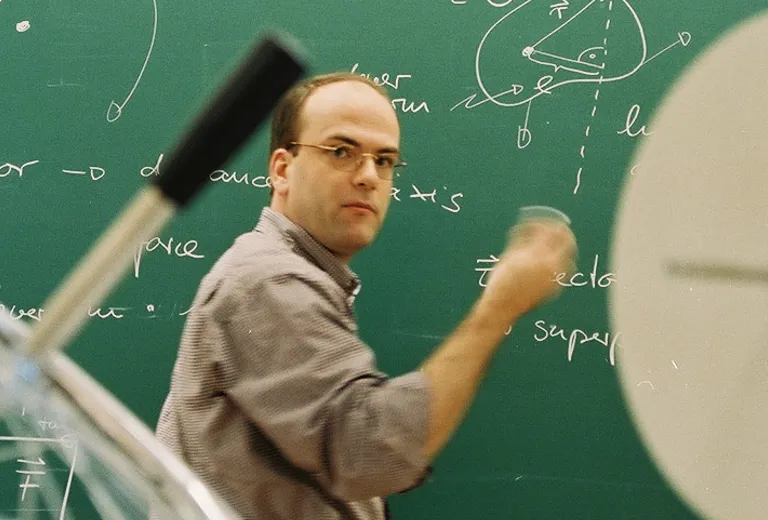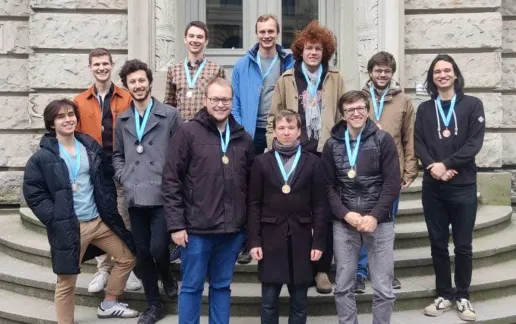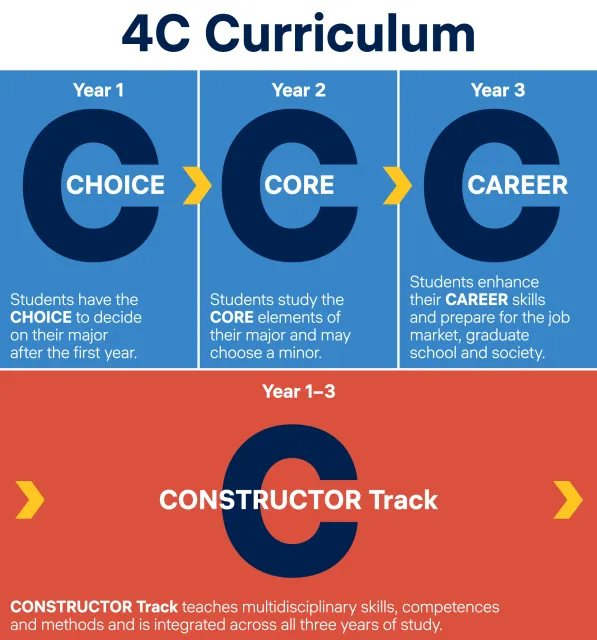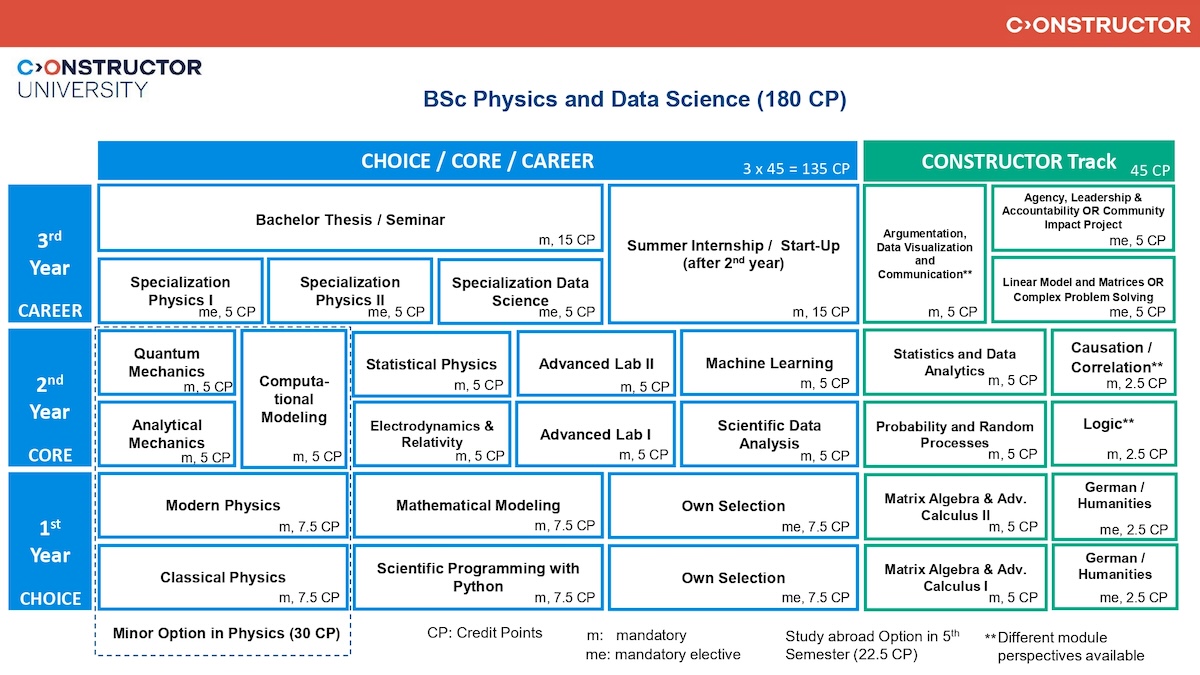

This study program belongs to the School of Science
Location: On Campus
Physics and Data Science (PhDS) is the follow-up program of Physics, as data science plays an increasing role in the world of physics.
Physics has shaped our view of the universe and the world around us by studying the basic concepts of space, time, and matter. Physics not only lays the foundation for other natural sciences and many engineering disciplines but is also a fundamental part of modern technology such as transistors, lasers, or global positioning systems. Physics is also of fundamental importance for global challenges such as global warming, E-mobility, or renewable energies. Moreover, quantum computing is a rapidly emerging technology that harnesses phenomena of quantum mechanics to tackle problems too complex for classical computers.
The Constructor University Physics and Data Science major is a three-year BSc program, fully taught in English. Its physics content is oriented along the guidelines of the Konferenz der Fachbereiche der Physik (KFP) in Germany, the Institute of Physics (Britain) for BSc in Physics, and the topics required for the Graduate Record Examination (GRE) Physics test. The data science component is being developed and taught in close collaboration with the Computer Science faculty at Constructor University. The Physics and Data Science program is frequently optimized and fine-tuned by feedback from students and instructors and developments in research and teaching.
The scientific knowledge, the international network of Physics alumni, and the problem-solving and social skills acquired during studies of Physics and Data Science at Constructor University guarantee success in our increasingly technology-driven society, as demonstrated by our many very successful graduates.
Our students regularly outperform on international and national physics competitions: i.e. gold medals at the international University Physics Competition in 2014 and 2021, silver medals in 2015, 2016, 2017, 2018, and outstanding performances also at the DPG (German Physical Society) DOPPLERS as well as PLANCKS.



The undergraduate program at Constructor University is a three-year, 180-credit-point program designed to prepare students for a wide range of career paths.
The “4C Model” is the program's backbone, with disciplinary content grouped into three themes according to study years: CHOICE-CORE-CAREER. Additionally, the “CONSTRUCTOR Track”, an integral part of the program, runs parallel throughout the program. It provides students with multidisciplinary content and essential skills such as argumentation, data visualization, societal engagement, and communication.
The curriculum allows students to tailor their education to their goals and to explore different fields of study, with the flexibility to change their major within the first year. Moreover, the programs include a mandatory internship and a study-abroad opportunity in the fifth semester to provide students with hands-on experience and a global perspective.

The first study year is characterized by a university-specific offering of disciplinary education that builds on and expands upon students’ entrance qualifications. Students select introductory modules for a total of 45 CP from the CHOICE area of a variety of study programs, of which 37.5 CP will be from their intended major.
To pursue an PHDS major, the following CHOICE modules (30 CP) need to be taken as mandatory modules during the first year of study:
- CHOICE Module: Classical Physics (7.5 CP)
- CHOICE Module: Programming in Python and C++ (7.5 CP)
- CHOICE Module: Modern Physics (7.5 CP)
- CHOICE Module: Mathematical Modeling (7.5 CP)
Students can choose between the following two mandatory elective CHOICE modules in the second semester:
- CHOICE Module: Core Algorithms and Data Structures (7.5 CP) or
- CHOICE Module: Algorithms and Data Structures (7.5 CP)
The remaining CHOICE module (7.5 CP) can be selected in the first semester of study according to interest and/or with the aim of allowing a change of major.
In their second year, students take a total of 45 CP from a selection of in-depth, discipline-specific CORE modules. Building on the introductory CHOICE modules and applying the methods students have already acquired so far, these modules aim to expand the students’ critical understanding of the key theories, principles, and methods in their major for the current state of knowledge and best practice.
To pursue Physics and Data Science, the following 45 CP mandatory CORE modules need to be acquired:
- CORE Module: Analytical Mechanics (5 CP)
- CORE Module: Electrodynamics & Relativity (5 CP)
- CORE Module: Quantum Mechanics (5 CP)
- CORE Module: Statistical Physics (5 CP)
- CORE Module: Advanced Physics Lab I (5 CP)
- CORE Module: Advanced Physics Lab II (5 CP)
- CORE Module: Computational Modeling (5 CP)
- CORE Module: Scientific Data Analysis (5 CP)
- CORE Module: Machine Learning (5 CP)
The Physics and Data Science CORE modules contain an advanced discussion of the major fields of physics and data science, as indicated by their titles.
In the third year of studies, students take 15 CP from major-specific or major-related, advanced Specialization Modules to consolidate their knowledge and to be exposed to state-of-the-art research in the areas of their interest. This curricular component is offered as a portfolio of modules, from which students can make selections during their fifth and sixth semester. The default Specialization Module size is 5 CP, with smaller 2.5 CP modules being possible.
To pursue Physics and Data Science as a major, 10 CP of the following major-specific PHYSICS Specialization Modules need to be taken.
- PHYSICS Specialization: Condensed Matter Physics (5 CP)
- PHYSICS Specialization: Particles, Fields and Quanta (5 CP)
- PHYSICS Specialization: Biophysics (2.5 CP)*
- PHYSICS Specialization: Atoms and Molecules (2.5 CP)*
- PHYSICS Specialization: Nanotechnology (2.5 CP)*
- PHYSICS Specialization: Advanced Optics (2.5 CP)*
and 5 CP of the following major-specific DATA SCIENCE Specializations Modules need to be taken:
- DATA SCIENCE Specialization: Deep Learning (5 CP)
- DATA SCIENCE Specialization: Data Visualization and Image Processing (5 CP)
- DATA SCIENCE Specialization: Stochastic Modeling and Financial Mathematics (5 CP)
A maximum of 5 CP can be taken from major-related modules instead of major-specific Specialization Modules:
- MCSSE: Quantum Informatics (5 CP)
- MMDA Specialization: Foundations of Mathematical Physics (5 CP)
- MMDA Specialization: Topology and Differential Geometry (5 CP)
- ECE CORE: Electronics (5 CP)
- ECE CORE: Information Theory (5 CP)
- CBT CORE: Physical Chemistry (5 CP)
Further specialization modules can be voluntarily taken on top of the 180 CP required for graduation (these will not be graduation-relevant). Please consult a Physics and Data Science SPC for further options.
As a core element of Constructor University’s employability approach students are required to engage in a mandatory two-month internship of 15 CP that will usually be completed during the summer between the second and third year of study. This gives students the opportunity to gain first-hand practical experience in a professional environment, apply their knowledge and understanding to a professional context, reflect on the relevance of their major in employment and society, reflect on their own role in employment and society, and find professional orientation. As an alternative to the full-time internship, students interested in setting up their own company can apply for a start-up option to focus on the development of their business plan.
The CONSTRUCTOR Track is another important feature of Constructor University’s educational model. The Constructor Track runs orthogonal to the disciplinary CHOICE, CORE, and CAREER modules across all study years and is an integral part of all undergraduate study programs. It provides an intellectual tool kit for lifelong learning and encourages the use of diverse methodologies to approach cross-disciplinary problems. The CONSTRUCTOR track contains Methods, New Skills and German Language and Humanities modules.
Methods
Methods and skills such as mathematics, statistics, programming, data handling, presentation skills, academic writing, and scientific and experimental skills are offered to all students as part of the Methods area in their curriculum. The modules that are specifically assigned to each study programs equip students with transferable academic skills. They convey and practice specific methods that are indispensable for each students’ chosen study program. Students are required to take 20 CP in the Methods area. The size of all Methods modules is 5 CP.
To pursue PHDS as a major, the following Methods modules (20 CP) need to be taken as mandatory modules:
- Methods Module: Matrix Algebra & Advanced Calculus I (m, 5 CP)
- Methods Module: Matrix Algebra & Advanced Calculus II (5 CP)
- Methods Module: Probability and Random Processes (5 CP)
- Methods Module: Statistics and Data Analytics (5 CP)
New Skills Modules
This part of the curriculum constitutes an intellectual and conceptual tool kit that cultivates the capacity for a particular set of intellectual dispositions including curiosity, imagination, critical thought, and transferability. It nurtures a range of individual and societal capacities, such as self-reflection, argumentation and communication. Finally, it introduces students to the normative aspects of inquiry and research, including the norms governing sourcing, sharing, withholding materials and research results as well as others governing the responsibilities of expertise as well as the professional point of view. Students in this study program are required to take the following modules in their second and third year:
- New Skills Module: Logic (2.5 CP)
- New Skills Module: Causation and Correlation (2.5 CP)
- New Skills Module: Argumentation, Data Visualization and Communication (m, 5 CP)
Furthermore, they must choose either
- New Skills Module: Linear Model/Matrices (me, 5 CP) or
- New Skills Module: Complex Problem Solving (me, 5 CP)
as well one of the following modules:
- New Skills Module: Agency, Leadership and Accountability (me, 5 CP) or
- New Skills Module: Community Impact Project (me, 5 CP).
German Language and Humanities Modules
German language abilities foster students’ intercultural awareness and enhance their employability in their host country. They are also beneficial for securing mandatory internships (between the 2nd and 3rd year) in German companies and academic institutions. Constructor University supports its students in acquiring basic as well as advanced German skills in the first year of the Constructor Track. Non-native speakers of German are encouraged to take 2 German modules (2.5 CP each), but are not obliged to do so. Native speakers and other students not taking advantage of this offering take alternative modules in Humanities in each of the first two semesters.

All study programs at Constructor University are accredited by the German Accreditation Council, guaranteeing adherence to high academic quality and international standards. This accreditation confirms that each program meets formal and subject-related criteria in terms of content, structure, and intended learning outcomes.
Join Constructor University in 5 easy steps:
- Complete your application
- Receive your decision after 3-4 weeks
- Learn about financing options
- Enroll and pay your deposit
- Settle in during O-Week and start your studies


Discover all the information you need about our fees and financing options for Constructor students. Our dedicated Student Financial Service Team will assist you in finding the best financial solution that will enable you to pursue your desired program and create a successful career path.
Cost of attendance 2025 / 2026
The direct costs of attendance include tuition, room and board, and fees, as outlined below.
A Constructor University BSc in Physics and Data Science provides a solid and simultaneously flexible foundation for careers in diverse fields, from basic research (which frequently includes scientific data analysis) to engineering and life sciences, to finance and management. The scientific knowledge, the data handling qualification, the problem-solving skills, and the social skills acquired during studies of physics and data science at Constructor University guarantee success in our increasingly technology-driven society, as demonstrated by our many very successful graduates.
The broad training in analytical skills, data handling, technical thinking, and the appreciation of complexity and subtlety allows data-aware physicists to work—often with additional qualifications—as management consultants, patent attorneys, market analysts, or risk managers. Many BSc degree recipients go on to graduate in Physics, Data Science and other fields, as careers in research and development usually require a postgraduate degree.
Constructor University Physics BSc graduates have an excellent placement record in top graduate programs, which will improve further by the added data handling skills in the present program. Very helpful for career development is also the opportunity for international network building with Constructor University students coming from more than one hundred different nations. Good communication skills are essential, since many physicists work as part of a team, have contact with clients with non-physics backgrounds, and need to write research papers and proposals. These skills are particularly well developed in the broad and multidisciplinary undergraduate program at Constructor University.

This study program is part of the School of Science.
The School of Science focuses on multidisciplinary research and teaching to enhance the quality of life, health, and longevity through science and technology. Different approaches are used to study novel bioactive substances and functional materials at the molecular and nanoscale as well as to advance quantum technologies and exploit resources and energy in a sustainable manner.
Key disciplines in the school include Mathematics, Physics, Biochemistry, Biotechnology, Cell Biology, Chemistry, and Earth Sciences.


Become part of a global community
Constructor University Students come from all over the world to live and learn at Constructor University. Our student body represents 120 nations. They form an ambitious campus community whose internationality is unprecedented in Europe. Constructor University’s green and tree-shaded 80-acre campus provides much more than buildings for teaching and research.

Call us or write us – we are happy to help you with your inquiry.
Phone: 0421 200 4200
Email: study@constructor.university



